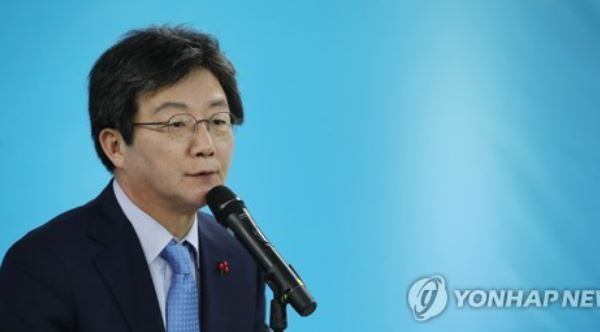Opposition party calls on Moon to withdraw proposal to delay Korea-US military drills
By YonhapPublished : Dec. 20, 2017 - 16:00
The minor opposition Bareun Party urged President Moon Jae-in on Wednesday to retract his proposal to postpone the springtime South Korea-US military drills until after the 2018 PyeongChang Winter Olympics should North Korea halt provocations.
Yoo Seong-min, its leader, stressed that security concerns, triggered by Pyongyang's stepped-up push for nuclear armament, trump those about the quadrennial games slated to take place from Feb. 9-25.
The liberal president told US broadcaster NBC on Tuesday that he made the proposal to Washington as part of efforts to dial down tensions during the Winter Olympics in the alpine resort county, 180 kilometers east of Seoul.

"The crisis sparked by the North's nuclear and missile provocations is reaching its most critical point, and the next three to four months will be the most crucial period," Yoo said during a meeting with senior party members.
"The proposal for a delay at this juncture -- without a pledge (from the North) to cease provocations -- is problematic," he added.
The proposal came as Moon seeks fresh momentum for enhancing cross-border ties strained by Pyongyang's continued provocations, including its Sept. 3 nuclear test and a string of ballistic missile launches, including intercontinental ones.
Yoo also voiced concerns that the US administration's national security strategy, announced Monday, is at odds with Seoul's "three-no" policy stance against the deployment of an additional Terminal High-Altitude Area Defense system, its participation in the US-led missile defense network, and the development of a security alliance with Washington and Tokyo.
"The three-no policy that Seoul has stated vis-a-vis China clearly clashes (with the US national security strategy)," he said. "It was China that has carried out tremendous retaliation against the THAAD installation. ... It is time for Moon to focus on diplomacy with the United States."
Despite Seoul's reluctance to conspicuously align with America's anti-missile program, Washington's latest security strategy stated, "We will cooperate on missile defense with Japan and South Korea to move toward an area defense capability."
The document, which casts China as a "revisionist" power, also said that Beijing's infrastructure investments reinforce its "geopolitical aspirations" though Seoul seeks to join the China-led regional development initiative, called the One Belt, One Road.
Observers said that the document underscores the diplomatic dilemma for Seoul seeking to maintain stable ties with both major powers amid their intensifying rivalry. (Yonhap)


![[AtoZ into Korean mind] Humor in Korea: Navigating the line between what's funny and not](http://res.heraldm.com/phpwas/restmb_idxmake.php?idx=644&simg=/content/image/2024/04/22/20240422050642_0.jpg&u=)
![[Exclusive] Korean military set to ban iPhones over 'security' concerns](http://res.heraldm.com/phpwas/restmb_idxmake.php?idx=644&simg=/content/image/2024/04/23/20240423050599_0.jpg&u=20240423183955)



![[Graphic News] 77% of young Koreans still financially dependent](http://res.heraldm.com/phpwas/restmb_idxmake.php?idx=644&simg=/content/image/2024/04/22/20240422050762_0.gif&u=)
![[Herald Interview] Why Toss invited hackers to penetrate its system](http://res.heraldm.com/phpwas/restmb_idxmake.php?idx=644&simg=/content/image/2024/04/22/20240422050569_0.jpg&u=20240422150649)






![[Exclusive] Korean military to ban iPhones over security issues](http://res.heraldm.com/phpwas/restmb_idxmake.php?idx=652&simg=/content/image/2024/04/23/20240423050599_0.jpg&u=20240423183955)



![[Today’s K-pop] Ateez confirms US tour details](http://res.heraldm.com/phpwas/restmb_idxmake.php?idx=642&simg=/content/image/2024/04/23/20240423050700_0.jpg&u=)